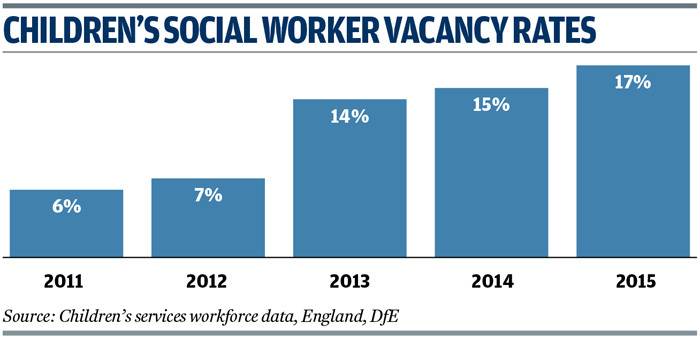Recruiting lapsed social workers
Jess Brown
Tuesday, September 13, 2016
A scheme to entice former children's social workers back to the job aims to help solve a rise in vacancies.

Between 2014 and 2015, the number of vacant children's social worker posts rose by a quarter, according to Department for Education figures.
The rise - which pushed the vacancy rate for children's social worker posts in England up from 15 to 17 per cent (see graphic) - came despite an increase of 240 in the overall number of practitioners.
In an effort to address the issue, the DfE has joined forces with the Local Government Association and Department of Health to launch a campaign to retrain social workers who have left the profession, whether due to a career break or to pursue other work opportunities.
They claim the Come Back to Social Work campaign will be "crucial", alongside local recruitment campaigns, to increase the number of experienced social workers (see case study).
The Association of Directors of Children's Services (ADCS) supports the campaign.
"As employers, we are absolutely committed to raising the profile of the social work profession and ensuring that social workers are well supported in their role," says Dave Hill, ADCS president.
"This campaign will hopefully show those social workers who have left the profession that it is perhaps easier than they think to come back to a profession that makes a profound difference to the lives of children, families and vulnerable adults."
But Ruth Allen, chief executive of the British Association of Social Workers, says that while the scheme is a positive step, it is not enough to solve the rising number of vacancies in children's social work.
"The campaign's impact on the number of people in the workforce is likely to be marginal," she says. "The problem is we don't have an effective workforce planning strategy to ensure we're training enough social workers to come in, and ensure we're keeping them in jobs."
Allen attributes the rise in vacancies to a failure by employers to offer social workers the right conditions and career pathways.
"This scheme will not turn the tide on that," she says. "We need serious discussions about how to retain social workers in jobs and how to have enough people coming into the profession."
The campaign aims to recruit 30 experienced staff initially. It will train participants to qualify them to re-register with the Health and Care Professions Council (HCPC).
All applicants, successful or not, will have access to a personal development plan on its online portal for six months, which will aim to help them with any future applications. They will also be held in a "talent pool", which can be targeted by potential employers.
It is open to applicants with two or more years, experience and who left the profession between two and five years ago. Those who are successful will receive learning and development workshops, mentoring and supervision.
Successful applicants will be provided with 13 weeks, training to prepare them to re-register with the HCPC, and be ready for work within councils from early 2017.
But Allen says the sector needs to examine why people are leaving the profession, and must learn from examples of good practice.
She is calling for a broader package of measures to improve recruitment and retention.
"We could definitely do more research into why people are leaving the profession. We need stronger, consistent evidence that could be linked to specific action."
For more details, visit www.comebacktosocialwork.co.uk

Case study: Cornwall Council set to launch local ‘return to social work, scheme aimed at qualified practitioners
Cornwall County Council has experienced workforce difficulties due to its geographical isolation, and has tried various methods to recruit and retain social work staff.
Its latest initiative will see it launch a "return to social work" scheme in early October that will provide a programme of support for qualified social workers who want to get back into the profession.
There are already eight people on its waiting list, says Marion Russell, principal child and family social worker at Cornwall council. She says the course has been developed for those who want to get back into the profession, either because they have not worked in a statutory place since qualifying or took a career break.
It is modelled on the assessed and supported year in employment (ASYE) programme, a national initiative that supports newly qualified social workers during their first year of employment. However, those who have been out of social work for more than five years since qualifying are not eligible.
The council's return to work initiative will offer participants a temporary, paid contract for four months to undertake practice and a study placement, incorporating 30 to 60 days of supervised practice. Each learner is to be given a learning and support plan, will be appraised throughout the course and have a written assessment at the end of the placement.
All learners who meet the course's requirements by the end of the course are then offered a permanent social worker post. "The learners are placed on a team that has a social worker vacancy, so it's with a view to them staying in that team," Russell says.
The initiative is part of a wider package of measures - including a trainee social work scheme - aimed at recruiting and retaining social workers, says Russell.
"We're growing our own experienced social workers, and that's partly a response to national need, but it also meets our needs in Cornwall," she adds.




